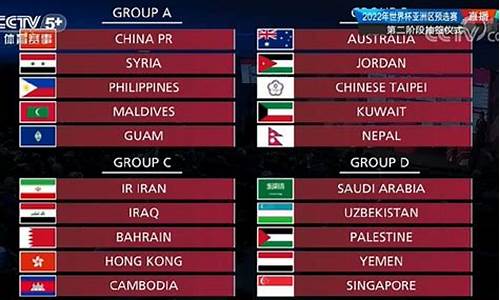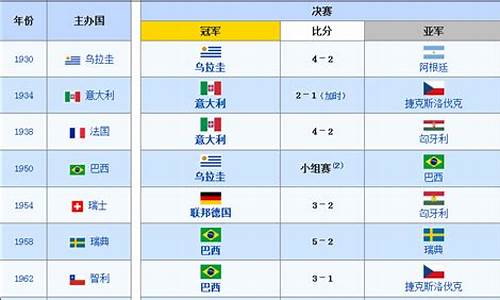世界杯英语词汇怎么说_世界杯英语词汇怎么说的
接下来,我将通过一些实际案例和个人观点来回答大家对于世界杯英语词汇怎么说的问题。现在,让我们开始探讨一下世界杯英语词汇怎么说的话题。
1.英语世界举办的词汇竞赛怎么样
2.求关于南非世界杯的英语对话,不要太长,最好有questions
3.英语期中复习资料 要英语(新目标)GO FOR IT 八年级 上册的
4.要求关于世博会的英语四级作文和世界杯的词汇,拜谢了,明天考试,
5.小学阶段英语动词词组
6.英语世界杯词汇比赛含金量高吗

英语世界举办的词汇竞赛怎么样
好。
1、英语世界词汇竞赛是国家级,全国范围内的比赛,能获奖的人的英语水平是很高的,要达到高分数能获奖,最低分45分可以拿到参与奖。
2、英语世界翻译大赛,截止2023年2月17日已成为国内最有影响的翻译赛事之一,也成功举办了2021年全国大学生英语词汇竞赛,受到国内知名专家及各高校师生的一致好评。
求关于南非世界杯的英语对话,不要太长,最好有questions
fighting 英?['fa?t?]? ? ?美?['fa?t?]? ?释义:n.?对抗;打架;加油
英英释义Noun:
the act of fighting; any contest or struggle;
战斗的行为;任何竞赛或斗争;
例句
用作名词 (n.)
1、They're fighting for the world title tonight.
他们今晚争夺世界冠军。
2、He tried to provoke them into fighting.
他企图挑拨他们打架。
扩展资料:
近义词的用法
encourage 英?[?n'k?r?d?]? ? ?美?[?n'k?r?d?]? ?
释义:vt.?鼓励;促进;支持
名词:?encourager?过去式:?encouraged?过去分词:?encouraged 现在分词:?encouraging第三人称单数:?encourages
词语用法
v. (动词)
1、encourage的基本意思是“鼓励”,指给予意志薄弱的人或缺乏经验的人不畏艰险、困苦的勇气和信心,或者提高某人的情绪,去迎接或完成艰巨的任务,引申可表示为“怂恿”“促进”“助长”“援助”等。
2、encourage只用作及物动词,通常接名词、代词或“名词所有格〔物主代词〕+动名词”作宾语; 也可接以动词不定式充当补足语的复合宾语,此时动词不定式可能指未来的动作,也可指正在进行的动作。
例句
用作及物动词 (vt.)
1、Her success encouraged me to try the same thing.
她的成功鼓励我尝试做同样的事。
2、Her parents encouraged her in her studies.
她的父母鼓励她好好学习。
英语期中复习资料 要英语(新目标)GO FOR IT 八年级 上册的
名词 n.
1. 原野;田地;牧场[C]
They were working in the cotton fields.
他们在棉田里干活。 2. 运动场,田赛场地;矿区,井田;(飞机)场,(战)场;(广阔的一大片)地[C]
He made a fortune in the gold fields of South Africa.
他在南非的金矿区发了大财。 3. (知识)领域;专业;(活动)范畴[C]
He is a prominent scholar in the field of linguistics.
他是语言学领域的杰出学者。 4. 实地;野外[the S]
As geologists, we work in the field most of the time.
作为地质学家,我们大部分时间在野外工作。 5. 物场;数域[C]
It shows the presence of a magnetic field.
这表明有磁场存在。 6. (赛马中)全部马匹[the S][G] 7. 棒板外野手[the S][G] 8. (旗、画等的)底色[C] 9. (望远镜等的)视野
及物动词 vt.
1. 棒板接(球);截(球);守(球)
He fielded the ball smartly.
他巧妙地将球接住。 2. 派...上场比赛
Italy fielded a strong team for the World Cup.
意大利派了一支强队角逐世界杯。 3. 巧妙地回答
The Minister had to field some tricky questions from the reporters.
部长不得不巧妙地回答记者的一些难以对付的问题。
不及物动词 vi.
1. 棒板担任外野手
以下结果来自互联网网络释义 field
1. 字段,信息组,域
常见计算机英语词汇解释(1)-外语-西安教...
field 字段,信息组,域
2. 字段;现场
电工专业英语词汇E-I-|行业英语词汇大全...
field字段;现场
3. 肥沃的 ........... 田 地
C/joke《新发现》 穆氏创造的英语...
field .........肥沃的 ........... 田 地
要求关于世博会的英语四级作文和世界杯的词汇,拜谢了,明天考试,
准时 on time
欢迎返校。 Welcome back to school.
教师节快乐!Happy Teachers’Day!
没关系。It does not matter.
过得快活 have fun
我没有主意。I have no idea.
做一次演讲 give a talk
例如 for example
姓 family name
名字 given name
……的简称 be short for …
为某人制作某物 make sth. for sb./ make sb. Sth.
给某人买某物 buy sth. for sb./ buy sb. Sth.
不再…… not…any more
浪费时间 a waste of time
去野外旅行 have/go on a field trip
去远足 go hiking
去野餐 have/go on a picnic
后天 the day after tomorrow
前天 the day before yesterday
山顶 the top of a mountain
被……绊倒 trip over
赶快 hurry up
我同意 I agree
系好我的鞋带 tie my shoes
走错路 go the wrong way
昨晚 last night
下星期 next week
相聚 get together
在中秋节 on Mid-autumn Festival/Day
顺便拜访 come over
在一年的这个时候 at this time of year
在户外 in the open air
尝起来有点像 taste a little like…
晚安 good night
昨天早上/下午/傍晚 yesterday morning/afternoon/evening
你要再来一块吗?Would you like another one?
我可以尝一下吗?May I have a taste?
晚上好 good evening
明晚你有空吗?Are you free tomorrow evening?
喂养动物 feed the animals
同意……的意见 agree with…
种水稻/小麦 grow rice/wheat
呆在笼子里 stay in cages
在春/夏/秋/冬季 in spring/summer/autumn/winter
住在农场上 live on the farm
上大学 go to college
住在一幢大楼里 live in a tall building
不得不 have to
住在十九层 live on the nineteenth floor
所有之中最多的 the most of all
学校毕业 leave school
每一块地 each field
一场海豚表演 a dolphin show
我可以找……听电话吗?May/Could I speak to …,please?
有什么事吗?What’s up ? / What’s the matter?
没什么事。Nothing much.
动物玩具 toy animals
在农村/城镇/城市 in the country / town / city
让我们讨论一下。Let’s discuss it.
让我们把时间定在…… Let’s make it…(时间前不加at)
哪一个你比较/最喜欢?Which (one) do you like better/best?
带某人/物去某地take sb./sth. to …(home,there,here不加to)
将某人/某物带来 bring sb./sth.
有空/自由的 be free
为……感到难过 feel sorry for
对……有益 be good for
在山林里 in forests and mountains
跌入……里 fall into…
去看** go to the cinema
离……很远 far from…
在……的背上/背面 on the back of
遥远的 far away
你认为怎么样? What do you think?
请求/询问 ask for
学习第一。Work must come first.
上上下下 up and down
仍然很感谢你。Thank you all the same.
最好(不要)做某事 had better do sth/had better not do sth
It is(not) better to do sth.
告诉某人做某事 tell sb to do
在……的前面(整个物体的前面) in front of
在……的前面(物体空间里面的前面) in(at) the front of
在左边/右边 on the left/right
笑着说 say with a laugh/smile
在这个时候(现在) at the moment/at this time/right now
把……从一个传递到另一个 pass…from one to another
到……里面去/从……出来 get into…/get out of…
一点儿早/晚 a little early/late
上来 come up
在…与…之间的不同 the difference between … and …
Jim Allan Green 王 小明
(first name)(middle name)(family name)(family…)(given…)
( given names )( last name )
姓名的意义 the meaning of a name
南瓜饼 a pumpkin pie
你打算做什么(加未来的时间)?What are you going to do …?
他们在到达那里的途中遇到了一些麻烦。
They have some problems getting there.
我们一边远足一边吃时新水果会有许多乐趣。We are going to have lots of fun hiking and eating a new kind of fruit.
你愿意……吗?Would you like to do sth ?
里面有甜点的小园饼 small round cakes with something sweet
inside. 三者/所有之中最好的 the best of the three/of all
我们都有一个秋天的节日。We each have an autumn festival.
我很高兴你能来。I am very glad you can come.
让我跟你一块走吧。Let me walk with you.
听到/看到某人/物正在干某事 hear/see sb/sth doing sth.
直到晚上很晚 until late at night
想要做某事 want to do sth/would like to do sth.
在摘玉米之后 after picking corn
提出建议及应答:
Shall we/I +动词原形 ?OK/All right/Good idea…
Why not +动词原形?= Why don’t you/we/they…?
Let’s +动词原形. No,let’s… (否定回答)
让某人做某事 let sb(宾格) do sth
这就是……的原因 That is why …….
观看/注视某人/某物做某事 watch sb/sth do/doing sth
(使用动原表示看到动作全部;使用现在分词表示看到动作瞬间)
让我们在一点差一刻出发 Let’s leave at a quarter to one.
更早一点/早得多 a little earlier/much earlier
(a little/much可以修饰形容词比较级)
跟某人打招呼/告别 say hello to sb/say goodbye to sb
对……很熟悉 know…very well 靠近 next to
沿着……走 go along/walk along/go down
问路句型:
Excuse me. Where is the (nearest) …,please?
Excuse me. Is there a …… near here?
Excuse me. How can I get to the ……?
在第……路口向左/向右转
take the 序数词turning on the left/right
离这里大约有……公里远It is about … kilometer(s) away.
沿着左/右走大约还有……米
It is about … meters along on the left/right.
加拿大/加拿大人 英国/英国人 瑞典/瑞典人
Canada/Canadian(s) England/Eghlish Sweden/Swedish
澳大利亚/澳大利亚人 美国/美国人 日本/日本人
Australia/Australian(s) America/American(s) Japan/Japanese
喜欢做运动 like doing sports 做同一件事 do the same thing
喜欢做某事(含有享受欣赏的意思) enjoy doing sth
乘坐……路车去上班 catch/take the NO. … bus to work
找到;发现(需费时费力)find out 多伦多市 the city of Toronto
听到这个(消息)我很难过/遗憾 I am very sorry to hear that.
将……带到这儿来/带到那儿去 bring sth here/take sth there
照顾好你自己 look after yourself 保持健康 keep healthy
昨晚/去年 last night/year 成长;长大 grow up
上周三/去年二月 last Wednesday/February
想要做商人/医生/警察/士兵 want to be a businessman/doctor/
policeman/soldier三天/半小时前 three days/half an hour ago
从一个地方旅行到另一个地方 travel from one place to another
同时 at the same time 回到纽约 be back in New York
多么有趣和令人兴奋啊! How interesting and exciting!
刚才 just now/a moment ago 顺便说一下 by the way
在客厅/卧室/书房 in the living room/bedroom/study
没有反应/回答 there is no reply 使……恢复正常 put…right
关于……有些问题/毛病 there is something wrong with…
我的工作是销售电脑。My job is to sell computers.
吃一点儿早餐 have a light/little breakfast
分秒必争 every minutes counts 打电话 make telephone calls
出门 go out/be out在早餐/午餐/晚餐时 at breakfast/lunch/supper(dinner)
我希望你现在好多了。I hope you are better now.
开始/着手干某事 start/begin to do/doing sth
结束/完成干某事 finish doing sth
早餐之前你做了什么?What did you do before breakfast?
忘记要去做某事/记着要去做某事
forget to do sth/remember to do sth
忘记已经做了某事/记得已经做了某事
forget doing sth/remember doing sth
他说的每句话/他做的每件事 everything he said/he did
听……/听到 listen to…/hear 看……/看到 look at…/see
找……/找到 look for…/find 起先/最后 at first/at last
询问某人有关……ask sb about 出生于 be born
关于……的每件事 everything about…
要求某人做某事 ask sb to do sth 向某人要某物 ask sb for sth
你出生在哪里/什么时候?Where/When were you born?
一直;始终 all the time 摇滚乐队 the rock band
开音乐会 give a concert 在音乐会上 in(at) the concert
中央电视台记者 a journalist from CCTV
被称为甲壳虫的著名乐队 a famous band called The Beatles
你出生时谁给你取的名字?Who named you when you were born?
五千多人 more than five thousand people
发生了一次事故 have an accident 跌倒 fall down
继续/继续做某事 go on/go on doing sth
非常粗心大意/小心仔细 be very careless/careful
一些他们最著名的歌曲 some of their most famous songs
忘记过去 forget the past 在某人的心里 in one’s heart
在……的结尾/开始 at the end of…/at the start of …
在……的中间 in the middle of… 在音乐会后after the concert
在中国的其他一些地方 in some parts of China
在中国的大部分 in much of China/in most parts of China
在中国的哪一地区 which part of China/which place in China
许多其他的游客 many other tourists 匆忙地 in a hurry
在……以前 before…… 在……以后 after……
(一段时间)以前/以后 ……ago/later 如果…… if……
在……的时候 when……在语言方面很擅长 be good at languages
科学家/自然科学 science/scientist 结婚 get married
足球世界杯 the Football World Cup 上演;放(唱片)等put on
你在学校里最喜爱的学科 your favourite subject at school
每个人 everyone/everybody 任何人 anyone/anybody
一些人;某个人 someone/somebody 没有人 no one/nobody
一切事(物) everything 任何事(物) anything
一些事(物);某个事(物) something 没有事(物) nothing
从……持续到…… last from … to …
询问日期: What is the date today?(注意过去与现在的时态
询问星期: What day is it today? 变化 is --- was)
询问天气: What is the weather like today / in + 地点?
变得更暖/冷/长/短 get warmer/colder/longer/shorter
变绿/黄 turn green/yellow 开花;发芽 come out
在田野里 in the fields 打电话给…… ring up sb/ring sb (up)
在一年的(天气)坏时节里 at a bad time of year
你说话的口音/方式 the way you speak 三月下旬 late March
与……不同 be different from… 暖和的衣服 warm clothes
这是个容易/难以回答的问题。That is an easy/a hard question.
喜欢……更胜于…… like…better than… 以后 later on
其他任何一个…… any other +单数名词
需要去做某事 need to do sth 几乎相同 be nearly the same
完全相反 be the opposite 这是真的。That’s true.
访问中国最好的时间 the best time to visit China
今天天气好冷啊! What a cold day (it is today)!
How cold it is today! 我恐怕(担心,害怕……) I’m afraid
这个问题的答案 the answer to this question
滑旱冰 go roller-skating 学校操场school playground
给某人一个电话 give…a ring/call 有时;偶尔 at times
淮河以北将有一场大风。There will be a strong wind to the
north of the Huai River. 在中国的西部in the west of China
北京在中国的北方。 Beijing is in the north of China.
日本在中国的东面。 Japan is to the east of China.
天气预报 a weather report 在东北/西北 in the Northeast/Northwest
在白天/黑夜 in the day(daytime)/in the night
保持在零度以上 stay above zero 降到零度以下fall below zero
高温/低温 the high/low temperature 爬山 climb the mountain
看书/洗衣服/搞卫生 do some reading/washing/cleaning
在下雨天 on rainy days 一次聚会 a get-together
在世界各地 across the world 感到快乐/悲伤 feel happy/sad
祝贺与应答: ---Happy New Year! ---The same to you.
---Happy birthday! ---Thank you very much.
邀请与应答: Would you like to …? I’d(would) love to.
Can you ……? Thank you for…….
I hope you can ……. I’m sorry, but I can’t …
请等一下。Hold on(打电话用)/One moment, please.
我恐怕我也许会晚一点。I’m afraid I may be a little late.
捎/留个口信 take/leave a message 翻过来 turn over
我可以为你捎个口信吗?Could/Can I take a message for you?
你可以为我留个口信吗Could/Can you leave a message for me?
我会将口信转告给…… I’ll(will) give… the message.
感谢你邀请我(们)。Thank you for inviting/asking me/us.
没有时间去做某事 there is no time to do sth
她其他的所有朋友 all her other friends 取出 take out
她的大部分/许多/一位朋友 most/many/one of her friends
生日礼物 birthday present 与……一样 be the same as…
什么也没有除了…… there is nothing but… 迟到be late for
缺课 be away from school 少于/多于/晚于less/more/laterthan
每隔多久(发生一次) how often 多久(指一段时间) how long
再多些/再来一块(个,张……) some more/one more
我可以吃一块蛋糕吗May/Could I have a piece of cake, please?
随便吃…… help yourself to… 只要一点点 just a little
你可以将……递给我吗? Could you pass me …, please?
一切都顺利吗?How’s everything going? 我们每个人each of us
在圣诞假期期间 during the Christmas holiday
寒假/暑假 winter/summer holiday 春节 the Spring Festival
在1月19日下午 on the afternoon of January 19th
小学阶段英语动词词组
1. The philosophies of Shanghai Expo are understanding, communication, togetherness and cooperation.
上海世博会的理念是:理解、沟通、欢聚、合作。
2. The secondary themes of Shanghai Expo are: multi-cultural integration, the promotion of city economy, technological innovation, the reconstruction of city communities, and the interaction of urban and rural sectors.
上海世博会的副主题是:城市多元文化的融合、城市经济的繁荣、城市科技的创新、城市社区的重塑、城市和乡村的互动。
3. The mascot of Shanghai Expo is "Haibao", which in Chinese means the treasure of the ocean. It's designed to resemble the Chinese character for "human", which corresponds to the theme of the Expo.
上海世博会的吉祥物名字叫“海宝”,意即“四海之宝”,以“人”为核心创意,契合上海世博会的主题。
4. The emblem of Shanghai Expo looks like the Chinese character for "world"; it is also combined with the numbers "2010" in an elegant way that resembles a celebrating family. It expresses the philosophies of Shanghai Expo: "Understanding, communication, togetherness, and cooperation."
上海世博会的会徽图案形似汉字“世”,并与数字“2010”巧妙组合,犹如一个三口之家相拥而乐,表现了家庭的和睦。表达了世博会“理解、沟通、欢聚、合作”的理念。
5. The main site of Shanghai Expo can be summarized as "one Axis and four Pavilions", these are: the Expo Axis, the China Pavilion, the Theme Pavilion, the Expo Center, and the Expo Performance Center.
上海世博会主要场地可以概括为“一轴四馆”,分别为世博轴、中国国家馆、世博主题馆、世博中心、世博演艺中心。
6. Oct 1, 2010 is the grand opening day of the China Pavilion. The Pavilion is designed to express the philosophy of China, to show the culture of the Chinese people, and to facilitate friendly international communication and improved cultural exchange between other nations and China.
2010年10月1日,为中国国家馆庆日,主要集中表达中国国家意志并展示中华民族文化形象的活动,旨在与其它国家开展友好交往和国际间文化艺术交流。
7. Shanghai Expo will be a feast of city life, a symphony of innovation and integration, and a dialogue of human civilization.
上海世博会将是探讨人类城市生活的盛会;是一曲以创新和融合为主旋律的交响乐;将成为人类文明的一次精彩对话。
8.The Expo Site spans both shores of the Huangpu River, between the Nanpu Bridge and Lupu Bridge. The Expo Site covers a total area of 5.28 square kilometers, with 3.93 sq km in Pudong and 1.35 sq km in Puxi. The area encloses 3.28 sq km.
上海世博会的举行地点在上海市中心黄浦江两岸,南浦大桥和卢浦大桥之间的滨江地区。世博园区规划用地范围为5.28平方公里,其中浦东部分为3.93平方公里,浦西部分为1.35平方公里。围栏区域范围约为3.28平方公里。
世界杯英语
field / pitch足球场
midfield中场
backfield后场
kickoff circle / center circle中圈
halfway line中线
touchline / sideline边线
goal line球门线
end line底线
penalty mark(点球)罚球点
penalty area禁区(罚球区)
goal area小禁区(球门区)
球队称谓篇
coach 教练
head coach主教练
football player足球运动员
referee裁判
lineman巡边员
captain / leader队长
forward / striker前锋
midfielder前卫
left midfielder左前卫
right midfielder右前卫
attacking midfielder攻击型前卫(前腰)
defending midfielder防守型前卫(后腰)
center forward中锋
full back后卫
center back中后卫
left back左后卫
right back右后卫
sweeper清道夫,拖后中卫
goalkeeper / goalie守门员
cheer team拉拉队
足球技术篇
kick-off 开球
bicycle kick / overhead kick倒钩球
chest-high ball半高球
corner ball / corner角球
goal kick球门球
handball手球
header头球
penalty kick点球
place kick定位球
own goal 乌龙球
hat-trick帽子戏法
free kick任意球
direct free kick直接任意球
indirect free kick间接任意球
stopping停球
chesting胸部停球
pass传球
short pass短传
long pass长传
cross pass 横传
spot pass球传到位
consecutive passes连续传球
take a pass接球
triangular pass三角传球
flank pass边线传球
log pass高吊传球
volley pass凌空传球
slide tackle铲球
rolling pass / ground pass地滚球
flying header 跳起顶球
clearance kick 解围
shoot射门
close-range shot近射
long shot远射
offside越位
throw-in掷界外球
block tackle正面抢截
body check阻挡
fair charge合理冲撞
diving header鱼跃顶球
dribbling盘球,带球
clean catching(守门员)接高球
finger-tip save(守门员)托救球
offside越位
deceptive movement 假动作
break through突破
kick-out 踢出界
足球战术篇
set the pace 掌握进攻节奏
ward off an assault 击退一次攻势
break up an attack 破坏一次攻势
disorganize the defence搅乱防守
total football全攻全守足球战术
open football拉开的足球战术
off-side trap越位战术
wing play边锋战术
time wasting tactics拖延战术
4-3-3 formation433阵型
4-4-2 formation442阵型
beat the offside trap反越位成功
foul犯规
technical foul技术犯规
break loose 摆脱
control the midfield 控制中场
set a wall筑人墙
close-marking defence盯人防守
比赛方式篇
half-time interval 中场休息
round robin 循环赛
group round robin 小组循环赛
extra time 加时赛
elimination match淘汰赛
injury time伤停补时
golden goal / sudden death 金球制,突然死亡法
eighth-final 八分之一决赛
quarterfinal 四分之一决赛
semi-final半决赛
final match决赛
preliminary match预赛
one-sided game 一边倒的比赛
competition regulations比赛条例
disqualification取消比赛资格
match ban禁赛命令
doping test药检
draw / sortition 抽签
send a player off判罚出场
red card红牌
yellow card黄牌
goal球门,进球数
draw平局
goal drought进球荒
ranking排名(名次)
英语世界杯词汇比赛含金量高吗
1. above / beyond: 介词,后面接抽象而不是具体名词时表示“无法做到”,例如:“above comprehension”的意思是“无法理解”。
2. in the absent of something: “缺少,没有”,用于替代“in short of”或者“be lacking in”。
3. be absorbed in something: “专心从事”。
4. abuse: 用在物品词后面表示“过量使用”,用在有生命的事物后面则表示“虐待”。
5. have access to something: 这个短语的意思要看后面接的单词是什么,比如“have access to town”表示“有道路通往市区”,“have access to the teacher”则是“有条件向老师请教”,总之,翻译的时候要灵活处理。
6. accessible / available: 形容词,中文的含义同上。
7. by accident: 介词词组,属于副词用法”,修饰动作,意思是“偶然”。
8. account: 名词,“解释,解说,叙述”。
9. account for: 本身是“解释说明”的含义,但在使用的时候可以翻译成“是…的原因”。
10. acknowledge: “向某个人表示感谢”。
11. acquire: 这个词的中文也非常灵活,通常由后面跟随的名词决定,如“acquire bad habits”就是“养成坏习惯”的含义。在商业用语中,该词则表示“吞并”。
12. in action: “起作用”。
13. adapt: 动词,在科技用语中表示“(将某个领域的研究成果)应用于(另一领域)”。
14. address somebody: “对某人说话,发言”。
15. afford: 用法非常灵活,总的来讲表示“承担不起”,后面可以接表示金钱,时间或者情感的词汇。
16. agent: 目前的含义主要指“行政职能机构”,比如美国的很多国家机构都叫agency,另外在生物化学领域,这个词翻译成“介质,载体”,而在计算机英语中则是“服务器”的意思。
17. agree with: “使人或者身体的某个部分觉得舒适”。
18. agreeable: “惬意,令人愉快,恰倒好处”。
19. agreement: 在阅读文章时通常是“一致的意见”这个含义。
20. air: “气氛”。
21. in the air: 表示“悬而未决,仍在酝酿中”。
22. allow somebody to do something: 中文可以翻译成“让,使得某个人去做某件事”。
23. alone: 阅读中有时和“only”是同一个意思,即“仅仅”,但是要用在单词或者句子后面。
24. ambitious: 中性词,“野心”或者“志向”的含义。
25. amount to: 在翻译或者阅读考试中的含义经常会是“竟然达到…的地步,程度”。
26. anchor: 动词有“固定,安定”的含义,而名词的用法中如果是用于新闻界,则表示“新闻播音员”。
27. appeal to somebody: “吸引某个人的注意力”。
28. appeal to court: 法律用语,“上诉”。
29. appearance: “状况,现象”。
30. apply: 日常生活中是“涂抹,敷药”的含义。
31. apply to something: “适用于”。
32. approach: 名词表示“方法,手段”,动词则是“处理,处置”。
33. appropriate to: “适用于,与之相应”。
34. argue: 在写作中可以表示“认为”,如果与介词同时使用,如“argue for”表示“支持”,“argue against”表示“反对”。
35. argument: “观点,主张”。
36. arrest one’s attention: “引起某个人的注意”。
37. art: “技术,技能”。
38. article: 日常生活购物场景下表示“一件商品”。
39. assert oneself: “表现自己”或“维护自己的权利”。
40. association: “联想,联想意义”。
41. assume: 动词,“承担任务或角色,任职”。
42. attachment: “依赖,眷恋”。
43. authorities: “政府当局”,或者由上下文决定的“最高机构”,例如在教育的文章中,这个词可能就是“教育部或者是校方,教师”的含义。
44. back up: “支持”。
45. balance: 在经济英语中指的是“帐面余额”。
46. bargain: 名词形式在口语中很常用,表示“物超所值的商品”。
47. –based: 这个词缀用在任何一个地点名词的后面,表示“总部位于某个地方”。
48. bear: 最原始的含义表示“承载,承受”。
49. bearing: 用在人的身上指人的“品格,气质”,日常是“方向”的含义。
50. better: 动词的意思是“优于,胜过”。
51. the better part of: “大多数,大半个”。
52. bid: 动词是“吩咐,命令”,名词有的时候有“试图,企图”的含义。
53. board: 名词最常用的含义是“委员会”,动词后面接交通工具则是“上火车,上船,上飞机”。
54. bold: 在印刷术语中是“粗体字”的含义。
55. be born to do something: “天生有能力做某件事情”。
56. be bound to do something: “一定会做某件事情”。
57. branch: “分支机构”,看上下文可以翻译成为“分校,分公司,银行分行”等等。
58. brand–new: “崭新的”。
59. bridge the gap: “缩短差距”。
60. brief: 动词可以表示“做简短介绍”,名词则是“短会”。
61. budget: 日常生活中可以翻译成“购物计划”。
62. build: 名词,之“人的身材”,而且应当是比较健壮的身材,多用于男士。
63. burst: 与其他一些单词连接使用,如“burst into tears”或者“burst into laughter”,翻译成“大哭”或者“大笑”。
. business: “事务”。
65. but: 后面接名词时是“除…以外”,因此“anything but”中文为“就不是…”,而“nothing but”则为“就是…”。
66. calculate: “盘算,估算”。
67. camp: 动词的含义是“驻扎”。
68. campaign: “(有益的大型)活动”。
69. cap: 本身的含义是“帽子”,但使用的时候则可以表示“最高部分,上限”。
70. at capacity: 词组,“全速地,完全地”。
71. capture one’s attention: “吸引某个人的注意力”。
72. car: “火车车厢”。
73. career: 虽然字典中常常将这个词解释为“事业”,但是在Langman Dictionary of Contemporary English中,这个词被注释为“a job or profession that you have been trained for, and which you do for a long period of your life”,因此实际的中文含义还是“职业”。 “undertaking”才是意义最广泛的“事业”。
74. carefree: 这个词在Langman Dictionary of Contemporary English的解释为“having no worries or problems”,相当于中文的“无所谓”,不知道为什么在所有的词典中都解释为“无忧无虑”,从中也可以看出英汉词典的局限。
75. case: 通常的含义是“情况“,如果在法律环境下则是“案例”。
76. cast: 日常生活中的含义是“铸造,塑造”,但是有一些固定的词组搭配,比如“cast a glance at something / somebody”是“将眼光投向某个事物或某个人”,“cast light on something”是“提供新信息,帮助理解”,而“cast a shadow on something”则是“在某件事情上投下阴影”。
77. cause: “事业,目标”。
78. cease to: “不再出现某种情况”。
79. ceiling: 在经济和数学用语中通常表示“上限”。
80. cell: 日常生活中,“cell phone”是“移动电话”的美式用法,在生物学领域则是“细胞”的意思。
81. cement: 作为动词,含义为“巩固,加强”。
82. center on: “以…为中心,围绕”。
83. certain: 在心理学环境下的英语解释为“feeling confident about yourself and your abilities”,因此中文可以翻译为“自信”。
84. chair: 动词的意思是“主持”,相当于“preside over”。
85. challenge: 在最新的Langman Dictionary of Contemporary English中,该词的解释为“to refuse to accept that something is right, fair, or legal”,翻译考试中,这个词通常要翻译成为“怀疑,质疑”。
86. chance: 科技英语中是“偶然性”的含义,因此“by chance”的意思是“偶然地”。
87. channel: 动词的含义是“引导”,名词是“渠道,路径”的意思。
88. charge: 动词含义有两个,在科技英语的环境下是“充电”,而在日常生活中是“索取(费用)”。名词通常是“电流”的含义。
89. be in charge of: “对…负责”。
90. check: “遏止,控制”。
91. chew: “琢磨,考虑”。
92. chip: “芯片”。
93. choice: 形容词的意思是“精选的”。
94. claim: 如果这个词后面接的是人,表示的含义是“让人丢了性命”。
95. class: 动词的含义同“classify”基本相同,表示“分类”。
96. clause: 法律用语中是“条款”。
97. click: 计算机用语中是“点击”,由于计算机英语在日常生活中的普及,很多单词转入日常生活时会出现其他的含义,比如这个词的英语解释中就包括“to suddenly understand or realize something”和“if two people click, they like, understand, and agree with each other”,如何翻译大家应当很容易想到了。
98. climate: “风气,风俗”。
99. climb up: 表示数字“缓慢上升”。
100. cloudy: “浑浊,模糊不清”,如果指心情,则表示“低沉,阴郁”。
101. coach: 动词,“给一个运动队或个人做教练或进行指导”。
102. coat: 生物、化学及医药用语中是“表面,外皮”的含义,因此例如“sugar coating”一类的词就是“糖衣”的含义了。
103. code: 法律用语中是“规则,法典”的含义。
104. collect: Langman Dictionary of Contemporary English中的一个解释为“to come to a particular place in order to take someone or something away”,中文含义为“领取,接走”。
105. colony: 生物学含义为“微生物的种群”。
106. command: “掌握,拥有”。
107. commercial: 名词是“电视商业广告”的含义,而“advertisement”一般指报纸中的广告。
108. commission: 通常的含义是“任务”,但是在商业用语中是“佣金,回扣”的含义。
109. be committed to something: “决心做某件事情”。
110. commitment: “决心”。
111. communicate one’s idea: “表达某个人的观点”。
112. community: 与其他名词连用表示“界”,比如“scientific community”就是“科技界”,此外复数“communities”也有“社会”的含义。
113. company: “同伴,一起”。
114. complain: 在很多时候都是“投诉”的意思。
115. file complaint: 这个词组的含义也是“投诉”。
116. complex: 如果用在建筑学上,是“一组建筑群”的含义。
117. concerning: 介词,“关于”,相当于“with regard to”或者“regarding”。
118. concerted: 形容词,“共同的”,比如“make concerted efforts”表示共同努力。
119. be conditioned to: Langman Dictionary of Contemporary English中的解释为“to make a person or an animal think or behave in a certain way by influencing or training them over a period of time”,中文的含义有点象“习惯于,受…的影响”。
120. conduct: 这个词在英语学习当中是非常重要的。首先,作为名词,含义是“人的行为,品行,举止”,而作为动词,它的含义与“do”基本一致,但主要用于褒义场合。
121. consequence: 本身是“结果,后果”,在词组“far-reaching consequence”中则是“影响,重要性”。
122. constitution: “组成(成分)”,法律用语是“宪法”,因此词组“constitutional right”就是“宪法赋予的权力”。
123. consume: 除去其“消费,消耗”的含义外,如果是“be consumed with”后面接表示情绪的名词,则表示“陷入,不能自拔”,因为根据Langman Dictionary of Contemporary English中的解释,这个词组的含义为“if a feeling or idea consumes you, it affects you very strongly, so that you cannot think about anything else”。
124. contain: 如果这个词后面出现的消极内容,则表示“抑制,遏制”。
125. context: 这个词与“environment”表示“自然环境”的含义相对,含义为“(抽象)环境”,“in the context”这个词组在单项词汇填空或者完型中被选的频率还是相当高的。
126. contract: 如果后面接表示疾病的单词,则做动词的含义是“得了(大病,急病)”。
127. contribute: 需要注意这个词,因为它是中性词,如果在消极的场合中,就是“造成”的含义。
128. conventionally: 字面含义是“常规上讲”,但在阅读中表示“过去”。
129. copy: 动词,“仿效,模仿”。
130. corner: 动词的含义是“逼迫”,另外在听力考试中曾出现过“cut the corners”表示“走捷径,用最简洁经济的方式做事”。
131. count: 及物动词表示“计算”,不及物动词则是“算数,起作用”。
132. count on: “指望”。
133. course: “河流的路径”,引申的含义是“事业”。
134. court: 动词“追求”,名词在法律用语中是“法庭”,体育用语中是“中型球场”,比如篮球,排球,网球等等。
135. cover: “掩盖”,含有贬义,此外在保险业用语中“cover loss”表示“保…险”。
136. crack down upon: “严厉打击”。
137. credit: 词组“give credit for / to”的含义非常灵活,总的来说是“表扬,嘉奖,归功于”,但是理解时要看上下文。
138. critical: “至关重要”,写作中可以用来替代“important”。
139. a crop of: 描述人的量词,表示“一批”,替代过去常用的“a generation of”。
140. cry: 词组“a far cry”表示“相差甚远”。
141. curse: “灾难,灾祸”。
142. cushion: 这个词做动词来用表示“减轻,缓和”。
143. cut and dried: “顺手就可以做到,轻而易举”
144. damage: 法律用语中是“赔偿金”的含义。
145. daring: “大胆,勇敢的”
146. dawn: 名词表示“开始,来临”,动词词组“dawn upon somebody”表示“理解,明白”。
147. deal: 这个词的构词能力很强,中文只能随着后面的名词变化,比如“deal a heavy blow”就表示“给…以沉重的打击”。
148. defend: 国防中是“保卫”,法律场合是“辩护”。
149. deliberate: 这个词做动词的时候是“深思”。
150. deliver: “发送,传送”。多用于发送信息,消息,邮件等场合。
151. deposit: 名词“存款,押金”。
152. deputy: 用在有些头衔的前面表示“副职”,比如“deputy prime minister”是“副总理”。
153. desert: 动词“抛弃”。
154. deserted: 形容地点表示“荒无人烟的”,形容人的心情则表示“孤独,沮丧”。
155. desirable: Langman Dictionary of Contemporary English中的解释“something that is desirable is worth having or doing”,如果用中文来解释,就是“很好”。
156. desperate: 形容人做事“拼命,买力气”。
157. detached: Langman Dictionary of Contemporary English对这个词的解释为“not reacting to or becoming involved in something in an emotional way”,有点象“indifferent”。
158. develop: 这个词的英语解释为“gradually form / acquire”,因此翻译的时候要根据后面的名词来处理,比如“develop an idea”表示“形成观点”,“develop a disease”中文是“得了病”。
159. devise: 动词,“设计,发明”。
160. dig: 动词词组“dig up”在考试中经常出现,是“搜集,发现”的含义。
161. digest: 动词“理解”的含义。
162. direct: 动词含义为“指导,命令”,属于指令性动词。
163. discipline: 名词是“学科”的意思。
1. dismiss: 英语解释为“to refuse to consider someone's idea, opinion etc, because you think it is not serious, true, or important”,中文是“打消,否认”的含义。
165. disorder: 精神病学中这个词是“精神错乱,失常”的含义。
166. disposal: “垃圾”的意思。
167. disturb: “mentally disturbed”这个词组的含义是精神失常的意思。
168. dive: 这个词有“急速下降”的含义,比如“take a nose dive”。
169. be divorced from: “分离,脱离”的含义。
170. document: 动词,“记录”。
171. documentary: 名词,“记录片”。
172. domestic: 常用的含义两个,一个是“国内的”,一个是“家中的”。
173. drain: “财富,精力等外流,逐渐耗尽”,因此词组“brain drain”表示“人才外流”。
174. dramatically / drastically: “大幅度,剧烈的”
175. drill: 石油业中名词含义是“钻头”,动词是“钻井”,日常生活中是“反复操练”的意思。
176. drop: “放弃”,在写图表作文时可以用作“下降”,替代我们经常使用的“increase”。
177. drug: “毒品”。
178. duty: 进出口内容中是“关税”的意思。
179. dwell upon: “仔细想,深思”。
180. earn: 中性动词,“赢得”或者是“遭到”。
181. echo: 动词,“应和,附和”的含义。
182. economy: “节约”,比如词组“practice economy”的意思就是“节约开支”。
183. effect: 动词“产生,导致”,有时也和其他单词形成固定词组,比如“effect payment”的含义是“付款”。
184. embrace: “接受,信奉某种观点”。
185. employ: “采用,采纳”。
186. be endowed with something: “to naturally have a good feature or quality”,中文含义为“天生具有…才能或者资质”。
187. engage sb: “雇佣”。
188. enjoy: 在很多时候中文翻译成“拥有,享有”,比如“enjoy good reputation”可以理解为“享有盛誉”。
189. established: “得到公认,已经确立的”。
190. in the event of: “如果,万一”。
191. evident: “显然的,明显的”。
192. execute: 企业用语中是“执行决策,处理”,法律用语是“处决”。
193. exercise: 与法律用词放在一起使用时,动词的含义是“行使,履行,执行”的意思。
194. exert oneself: 英语解释为“to work very hard and use a lot of physical or mental energy”,意思是“尽力,努力”。
195. exhaust: “耗尽(自然资源,精力等等)”。
196. be expert in something: “老练的,内行的”。
197. explode: “迅速增长”,如果是“someone explodes”则是“发怒”的含义了。
198. be exposed to: “接触到”。
199. faculty: 大学环境下指“全体教工”,指人时则是“天赋,禀性”。
200. fail to do: “没有能
goat在体育词汇中的意思
英语世界杯词汇比赛含金量高,《英语世界杯》全国大学生英语词汇大赛是一项具有很高含金量的比赛,它旨在激发学生们的英语学习兴趣,提高他们的英语词汇量和应用能力,从而提高他们的英语水平。首先是词汇量在10000以上,听说读写技能水平达到英国人或者美国人的水平,这些是最基本的条件。在思维品质方面,要有批判精神和创新思维习惯。在阅读量方面,除流行的那些英文名著之外,还要对有关英美国家的人文、地理、历史、科技、军事等方面的了解。
goat在体育词汇中的意思是GOAT(Greatest of All Time):历史最佳。体育英语词汇和术语:General Terms 一般词汇;Athletics 竞技;Individual Sports 体育项目;Games and Competitions 球类运动;Water Sports 水上运动;Bicycles and Motorcycles 自行车和摩托;Riding and Horse Races 赛马;Tennis 网球;Swimming 游泳;Football 足球;Baseball & Softball 棒球和垒球;Wrestling 搏击类竞技;Basketball 篮球。
体育英语词汇和术语:General Terms 一般词汇;Athletics 竞技;Individual Sports 体育项目;Games and Competitions 球类运动;Water Sports 水上运动;Bicycles and Motorcycles 自行车和摩托;Riding and Horse Races 赛马;Tennis 网球;Swimming 游泳;Football 足球;Baseball & Softball 棒球和垒球;Wrestling 搏击类竞技;Basketball 篮球。
非常高兴能与大家分享这些有关“世界杯英语词汇怎么说”的信息。在今天的讨论中,我希望能帮助大家更全面地了解这个主题。感谢大家的参与和聆听,希望这些信息能对大家有所帮助。
声明:本站所有文章资源内容,如无特殊说明或标注,均为采集网络资源。如若本站内容侵犯了原著者的合法权益,可联系本站删除。












